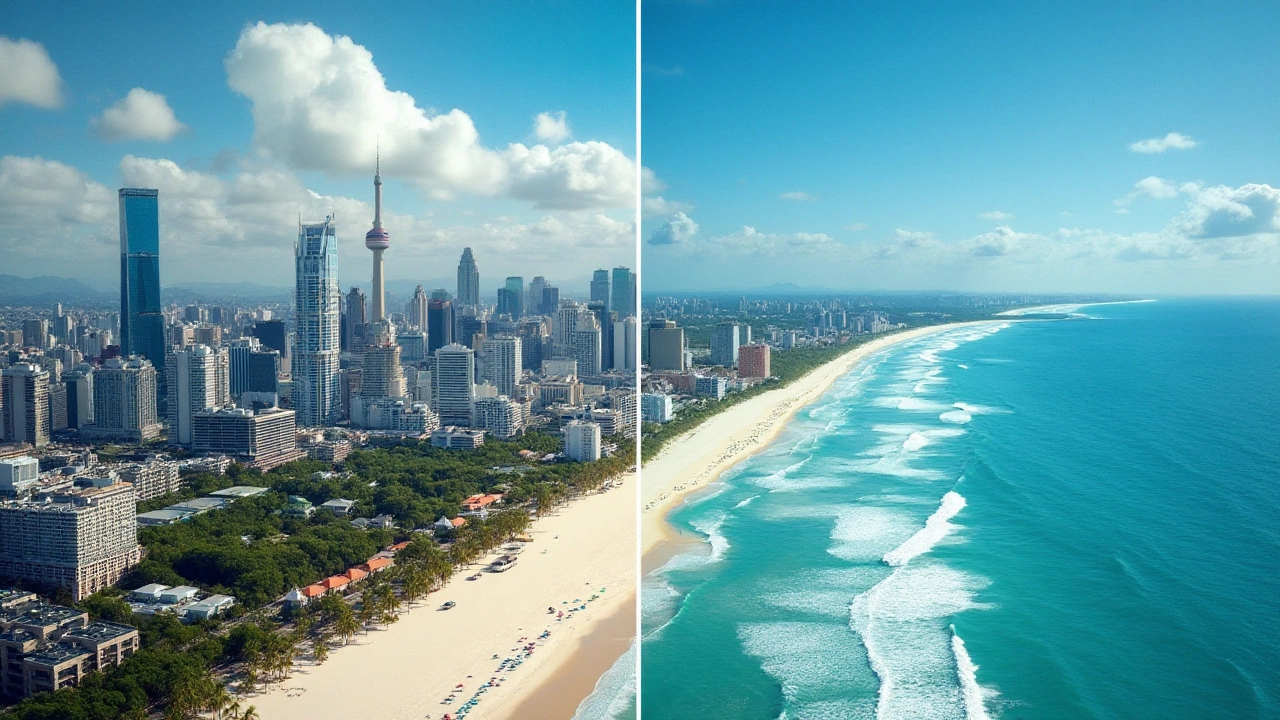All-inclusive resorts offer a tempting package of convenience and leisure; meals, drinks, and activities all bundled within the price of a stay can be quite appealing. Yet, in the United States, these resorts are not widely found. Why might this be so?
In this article, we delve into the nuances of the US hospitality industry to uncover why all-inclusive accommodations haven't gained the same traction as they have in other parts of the world. From economic reasons to cultural preferences, several factors play a role.
We also look at alternatives and tips for travelers seeking similar inclusive experiences within the country's borders. You might discover that a different approach might just be the key to enjoying all the perks without leaving the US.
- Understanding All-Inclusive Concepts
- The US Hospitality Landscape
- Economic and Cultural Influences
- Alternatives for the American Traveler
Understanding All-Inclusive Concepts
The idea of an all-inclusive resort is incredibly appealing to many travelers. Imagine checking into a hotel and seamlessly enjoying meals, drinks, and an array of activities without reaching for your wallet at every turn. That is the promise of all-inclusive hotels, a concept first popularized by the pioneering Club Med in the 1950s. This concept was born from the desire to create a hassle-free vacation experience where guests could immerse themselves in leisure without the constant need to budget for various aspects of their stay.
Located mainly in tropical paradise destinations like the Caribbean and Mexico, all-inclusive resorts cater predominantly to those looking for a getaway from the routine. They offer everything from gourmet dining, unlimited beverages, watersport activities, spa treatments, to entertainment shows, all within a consolidated package price. This model simplifies vacation planning and often represents significant value for money for families, honeymooners, and groups. Studies show that such arrangements account for a remarkable 70% of hotel rooms in places like the Dominican Republic, revealing their immense popularity in certain regions.
Though the US has its share of luxurious resorts, the all-inclusive concept has not been as wholeheartedly embraced. Unlike their counterparts in Mexico or Jamaica, where guests can anticipate an experience entirely curated to maximize relaxation and engagement without external planning, US resorts tend to operate on a pay-as-you-go model. Newcomers to the all-inclusive scene in the US are often surprised at how liberating it feels to discard the financial concerns that accompany dining and activities. Renowned travel expert Arthur Frommer once remarked, "All-inclusive resorts offer a unique value proposition – peace of mind. You pay once and forget about money for the rest of your stay."
At the heart of the all-inclusive concept is the idea of community and shared experiences. Many resorts actively encourage social engagement through themed evenings, communal dining, and group activities. This atmosphere contrasts sharply with some higher-end US hotels, where emphasis is placed on privacy and exclusivity. There are exceptions, of course, such as certain properties in Florida's Key West or select Hawaiian resorts which have begun incorporating inclusive packages to attract a broader audience. But for the most part, the US market remains driven by individual consumer choices rather than bundled offerings.
An interesting development is the increasing interest in niche all-inclusive experiences catered to specific interests like wellness, adventure, or cultural immersion. These may focus on yoga retreats, diving experiences, or culinary tours, creating a more specialized package tailored to the tastes of the discerning traveler. The model's flexibility holds great potential for appealing to diverse demographic groups. As the world becomes more connected, variations of the all-inclusive model might continue to evolve, bringing new life to this longstanding vacation tradition.

The US Hospitality Landscape
In the United States, the hospitality landscape has evolved uniquely compared to other parts of the world. Historically, the US hotel and accommodation industry has leaned heavily towards providing versatility and freedom of choice. American travelers, often accustomed to a culture that prizes variety and personalized experiences, tend to favor stays that offer numerous options rather than a fixed plan, which is the hallmark of the all-inclusive model. Instead of bundling everything into one upfront price, US hotels frequently allow guests the flexibility to choose and pay for amenities as they go, which some argue enhances the sense of luxury and personalized service.
This preference for choice can be traced back to the expansive array of dining and entertainment options available in close proximity to many US accommodations. Cities like Las Vegas and New York thrive on offering a smorgasbord of attractions and culinary experiences that outshine what any single resort could practically encompass. The abundance of nearby local attractions means visitors might not feel the need for an all-inclusive setup when rich experiences lie just outside the hotel door.
The size and diversity of the country also play a role. Unlike smaller nations where a resort model might dominate certain landscapes due to limited external options, the US offers a staggering variety of regional experiences that encourage exploration beyond resort walls. Each state harbors its own distinct identity, culture, and flavor, contributing to this broader pursuit of exploration. Travelers drawn to these unique experiences might find a predefined package less appealing.
Moreover, the US hospitality scene doesn't operate in a vacuum. Many major hotel chains cater to a largely domestic clientele and adapt their services to US preferences. With domestic tourism forming a major part of the travel market, these hotels might not feel compelled to adopt an all-inclusive model that has seen more popularity in international destinations like the Caribbean and Mexico. Some experts note the cost structure involved with the all-inclusive model would require a shift in pricing that US travelers are not familiar with, potentially altering their perception of value.
Marketing and consumer preferences intertwined with economic rationales help shape hospitality offerings. Despite its enchantment globally, the all-inclusive model doesn't align with traditional American travel values. As noted by Sarah Jones, a travel analyst with Leisure Insights, "The allure of all-inclusive resorts lies in the promise of simplicity, but American travelers often seek the autonomy and empowerment that comes from creating their own travel narrative." This insight captures a broader understanding of why traditional all-inclusive models haven't proliferated across the US landscape.

Economic and Cultural Influences
The absence of all-inclusive resorts in the United States can largely be traced to both economic and cultural dynamics that influence the hospitality landscape. When looking at economic reasons, consider the profitability models of American hotels, which differ markedly from their international counterparts. In the US, business models often focus on maximizing revenue through multiple channels such as on-site dining, events, and other add-ons, which are typically charged à la carte. This contrasts with the all-inclusive model, where the entire stay is bundled into a single upfront cost. Hotels may find catering to individual spending habits and preferences more profitable than adopting an inclusive pricing strategy.
Culturally, there's a profound difference in the way leisure is approached. American tourists often enjoy a diversity of experiences that include dining out at local restaurants, participating in off-site activities, and exploring cities. This fosters a desire for flexibility rather than the predetermined structure of all-inclusive packages. In contrast, destinations like the Caribbean or Mexico offer plentiful resorts where travelers often prefer staying within the confines of the resort itself for convenience and relaxation, engaging only with their immediate surroundings.
Another interesting perspective comes from Carol Bennett, a hospitality expert, who notes,
"Americans tend to see vacations as an opportunity for exploration and adventure, which rarely aligns with the idea of staying on a single resort for the duration of their trip."This concept of exploration is deeply ingrained in the American travel ethos. Such cultural leanings have a significant impact, pushing the industry to cater more towards customizable experiences rather than fixed itineraries.
An analysis of consumer behavior reveals that European tourists, who often frequent US destinations, are accustomed to more inclusive pricing structures closer to home. However, once in the US, they adapt to local hospitality norms, reflecting another layer of flexibility in consumer expectations. In fact, statistics show that only a small percentage of European tourists inquire about all-inclusive options when booking US trips, further suggesting that the demand isn't robust enough to drive domestic market changes considerably.
Ultimately, while there is a niche market for all-inclusive packages within the US, these economic and cultural elements create an environment where other models reign supreme, creating a rich tapestry of travel experiences shaped by norms both historical and contemporary. Yet, this doesn't mean you can't find similar offerings—it's just a matter of knowing where to look and adjusting your expectations accordingly.

Alternatives for the American Traveler
For American travelers yearning for the ease of an all-inclusive resort experience without venturing abroad, there are several creative alternatives that capture the spirit of this popular travel model. The United States, while not widely known for its all-inclusive resorts, offers diverse options that cater to a similar desire for packaged convenience. From charming bed and breakfast inns that bundle meals with stays, to cruise lines that offer all-inclusive itineraries, these options can fulfill the yearning for a stress-free vacation.
One popular alternative is the domestic cruise industry, which has long embraced the all-inclusive concept. Major cruise lines operate from various ports along both coasts and the Gulf of Mexico. With meals, entertainment, and a myriad of activities included in the fare, a cruise can feel like a floating resort experience. Cruises cater to different budgets and preferences, ranging from luxury experiences to family-friendly vacations with specialty dining and engaging programming for children. As maritime vacations proliferate, they are increasingly adept at offering themed cruises, such as around-the-world journeys or specialized itineraries focused on cuisine or music.
The allure of dude ranches offers another compelling choice. These ranches bundle accommodation, meals, and a varied menu of activities, making them akin to an all-inclusive hotel. Guests can partake in horseback riding, fishing, hiking, and campfire storytelling, all while enjoying hearty meals prepared with local flair. Some upscale properties have further refined the concept, providing gourmet meals, spa services, and additional activities. For travelers seeking a more rustic, nature-centered experience with the convenience of inclusive pricing, this can be a perfect option.
A recent guest at a Wyoming dude ranch described the experience as, "Surprisingly luxurious, with activities that allowed my family to bond without the fuss of planning each step of our holiday."
Moreover, savvy travelers can consider resorts with meal plans. While not strictly all-inclusive, they offer packages combining lodging and dining to simplify trip logistics. Large resorts in destinations like Florida and California may provide meal packages that include breakfast, lunch, dinner, and sometimes even snacks. These packages often come with additional perks such as priority reservations at on-site restaurants or discounts on activities, enhancing the overall experience.
Finally, experiential packages at hotels and resorts are becoming more common. Properties tailor packages that include accommodations linked with curated activities or nearby attractions, such as attending a concert, exploring a cultural landmark, or having exclusive dining experiences. Although these packages require some planning, they balance the need for a structured vacation with a touch of spontaneity, offering similar comforts to an all-inclusive retreat without the need for international travel.